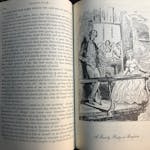The Alps: A Human History From Hannibal to Heidi and Beyond
By Stephen O'Shea. (Norton, 336 pages $26.95.)
I might have overlooked a book about the Alps if not for the word "Heidi" in the title. Johanna Spyri's novel about a mountain girl was a childhood favorite. And then there's that invasion with the elephants. And "The Sound of Music." And James Bond. Clearly, the book bore a look. Happily, Stephen O'Shea's account of the Alps' history is a delight. Through a summer of navigating a bazillion hairpin turns, he explores a stupendously mountainous region the size of Kansas, shifting gears with ease among Nazis, Hollywood, food, religion, tourism and more. Author of several books about European history, O'Shea is an engaging writer, if sometimes a little too clever, as when describing groups of cyclists (a goulash of Hungarians, a schnitzel of Austrians). Mostly, though, he brings a reader to a scene with a vivid skill steeped in obvious research and knowledge. I'd never quite grasped the depth of nationalistic tugs of war (and worse) across the Alps' expanse and, while eased considerably, how cultures still exist cheek-by-jowl, varying even from village to village. Far more than a backdrop for Julie Andrews' trill, the Alps have always stood in people's way.
KIM ODE
The Atomic Weight of Love By Elizabeth J. Church. (Algonquin Books, 368 pages, $15.95.)
Following brainy bird lover Meridian Wallace over several decades, "The Atomic Weight of Love" highlights the struggles of women in midcentury America to find fulfillment amid traditional gender roles and provokes thought over such issues as the justifications for war and the bonds of responsibility.
After the childhood loss of her beloved father and thanks to manual labor by her devoted mother, shy 17-year-old Meridian begins studying at the University of Chicago in 1941. She meets a brilliant physicist 20 years her senior and marries him, subverting her ambitions to join him at Los Alamos, N.M., where he's researching atomic energy after having helped develop the bomb.
Unable to get her doctorate in ornithology at Cornell, Meridian diligently studies a murder of crows and suffers embarrassment at not possessing an advanced degree, as the wives of the other scientists do. As her marriage grows stale and her husband increasingly difficult and distant, in midlife she meets a sexy "vegetarian hippie" veteran of the Vietnam War 20 years her junior. Described twice as "an animal in his prime," Clay introduces her to orgasms and marijuana. Just as Meridian is awakening to life's greater possibilities, she faces a crisis that alters her plans.
Author Elizabeth J. Church worked as an attorney for 30 years, as evidenced in a somewhat formal writing style and a focus on academic achievement. She cleverly names the chapters of her debut novel after groups of birds ("A Party of Jays," "A Deceit of Lapwings") that telegraph key events. This intellectual soap opera touchingly shows the joys, regrets and sorrows of a long life.
Marci Schmitt





